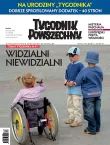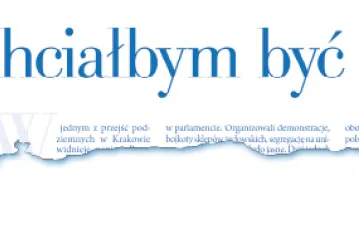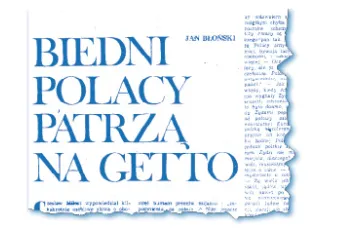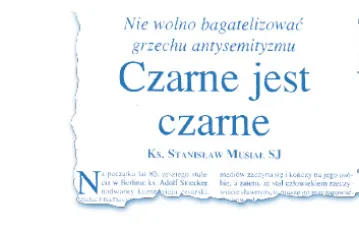Wykupienie dostępu pozwoli Ci czytać artykuły wysokiej jakości i wspierać niezależne dziennikarstwo w wymagających dla wydawców czasach. Rośnij z nami! Pełna oferta →
Jerzy Turowicz’s article appeared in Tygodnik Powszechny No. 11/57; for the editor-in-chief, it was the first of a long series of important articles on Polish-Jewish and Christian-Jewish relations. On his 80th birthday in 1992, Turowicz recalled the advice that journalist Wacław Zbyszewski had received from an older colleague, “Should you want to devote yourself to journalism, please remember that this is no easy way to earn a living but you can manage provided you steer clear of two subjects: the Jews and the Catholic Church..." “Well, as it happens, the bulk of my writings concerns precisely the Catholic Church and the Jews...," commented Turowicz.
I left Warsaw on 19 April 1943. More aircraft than usual were circling overhead, and machine gun stutter could be heard in the city, accompanied by explosions. It was already on the train that I learned of the uprising in the ghetto - SS units that moved to liquidate the Jewish district encountered armed resistance. Those who had virtually no chance of surviving fought Nazi fascism - not for their lives but for their human dignity.
The Warsaw Ghetto Uprising was the climax of the Jewish nation’s struggle against Nazism. The period between 1939 and 1945 witnessed the greatest tragedy in Jewish history. Out of three and a half million Polish Jews, more than three million perished in gas chambers and on killing fields. At the same time, several million Jews from other European countries died. The Poles who died in concentration camps and prisons were killed for resisting the German occupation, for fighting Nazism. Jews were mostly killed just for being Jewish.
This wartime generation of people who were persecuted, who suffered and fought, fundamentally changed Polish-Jewish relations in our country. Most Polish people were cured of anti-Semitism, which was replaced by a feeling of solidarity; the will to help the persecuted emerged and was widely reflected in people’s actions. During the Ghetto Uprising, another sentiment appeared as well: admiration for those who fought to the very end despite the hopeless circumstances.
At the time, along with many other people, I believed that there would be no anti-Semitism in the future Poland, and that this grim phenomenon would forever remain a thing of the past; and not just because there would be few Jews in Poland after the war.
Today, in 1957, it appears that this belief was an illusion. For some time now, a determined campaign against anti-Semitism has been waged in our press, which is proof that it still exists. We must, however, determine its scope, nature, and source.
I would say that there was virtually no anti-Semitism in Poland immediately after the war. There was a pogrom in Kielce - in 1946, if I am not mistaken - which was publicised all over the world, but I think (as many people in Poland do) that the circumstances surrounding the pogrom have not been sufficiently clarified to date. Later, no mention could be found in the press of anti-Semitism and we did not hear about it at all until 1956. There are no milieux or political or ideological groups in Poland today that would advocate anti-Semitism. A great change has taken place in this respect in the minds of Poles since 1939 and it may be claimed that, as a programme or worldview, anti-Semitism in Poland is dead.
However, in the last year, the press reported sporadic signs of anti-Semitism; moreover, it surfaced quite unexpectedly among certain members of the Polish United Workers’ Party - a weak and opposed trend, but present and observable at various party levels nonetheless. This form of anti-Semitism can best be described as an import that preys on certain dispositions that are still present in Polish society.
The purpose of this type of anti-Semitism is, on the one hand, to gain easy popularity among the less enlightened segments of society and, on the other, to use the small group of Jews living in Poland today as a scapegoat that is meant to distract us from important issues and causes of evil in various areas. Thus, this anti-Semitism has been promoted in order to deliberately provoke; it is diversionary and its intention is to corrupt the pro-reform and pro-democratisation camp and programme. Obviously, these attempts should be condemned in the strongest terms possible.
However, this does not exhaust the subject of anti-Semitism in Poland today. Firstly, the anti-Semitic slogans promoted in some circles meet with a favourable response among society at large. Secondly, of the small number of Jews who currently live in Poland - most probably not more than a hundred thousand - a great majority are leaving or wish to leave the country. Talk is of twenty or even twenty-five thousand Jewish applications for passports. The international press covers this issue extensively, claiming that the departures are the result of rampant Polish anti-Semitism. Matters are not that simple. A great number of Jews wished to leave Poland for Israel or other countries in the past because they consider Israel to be their new homeland or have family members abroad with whom they would like to be reunited. Previously, they were unable to leave Poland, now they are allowed to go abroad, and so they do. There is no doubt, however, that actual or feared anti-Semitism is among the motives that drive them as well.
Well, I think that in current circumstances these fears are unwarranted. During the occupation, Polish anti-Semitism was broken and many of its germs were eradicated. I would be the last person to disregard the signs of anti-Semitism that emerge from time to time; I believe they should be combated and, therefore, Tygodnik Powszechny is covering this issue.
Unfortunately, anti-Semitism has quite a long tradition in Poland; before the war, a significant proportion of the public was prone to it, and some primitive, less enlightened people are still willing to listen to anti-Semitic slogans.
Anti-Semitism stems from the Jews’ distinct identity and from the existence of the Jewish ethnic and cultural community which has survived for two thousand years despite the diaspora, and perhaps to some extent because of the diaspora and the fragmentation it engenders; in some cases, this community has not been dispersed even by generations of assimilation. This Jewish distinctiveness is exploited by anti-Semitism, which usually goes hand in hand with nationalism; certain negative qualities are attributed to the Jews as a social group and they are accused of having a destructive influence. In its extreme form, anti-Semitism becomes an irrational magical-cum-mystical worldview that ascribes to the Jews responsibility for all evil, accusing them of some global conspiracy against all non-Jewish humanity with the purpose of world domination. Anti-Semitism results in resentment, enmity and hatred towards the Jews as well as in attempts to isolate them and eliminate them from the society they live in, which in turn leads to boycotts, pogroms, and killings.
We will not present detailed arguments against anti-Semitism here. Firstly, anti-Semitism in its developed ideological form does not exist in Poland today; and secondly, its claims have already been rebutted many times and shown to be nonsensical and groundless. It has also been demonstrated more than once that one of the greatest disservices done to any society by anti-Semitism stems from the fact that it creates an entire mythology, attributing all evil to Jews and thus distracting our attention from the true causes of evil, which usually lie in the deficiencies of social, economic or political framework or system, and absolving us from responsibility to make a conscious effort to remove the true causes of evil.
We would, however, like to draw attention to two issues here. The first is the place of Jews in Poland and the second is the relationship between anti-Semitism and Catholicism.
As regards the first point: anti-Semites claim that Poland belongs exclusively to the Poles, while the Jews are an alien and harmful element and therefore their influence on Polish life should be kept to a minimum. Anti-Semites forget, however, about the origin of Jewish communities in Poland. They forget that the Jews arrived in Poland several hundred years ago because they were persecuted elsewhere and that Poland used to be rightly proud of its hospitality and tolerance. When it comes to Jewish rights, tolerance and hospitality need no longer be invoked today. After several hundred years of coexistence with Poles in the land between the Tatras and the Baltic, they are at home here, too - whether there are three million or one hundred thousand of them. They have made their contribution to the country’s history, economy and culture. Anti-Semites claim that this Jewish contribution was evil and harmful, but there are no grounds for such generalisations. Obviously, the Jewish impact was bad in some cases, just as the Polish one was. Both nations are just people.
Recently, we published a poem in Tygodnik Powszechny dedicated to the memory of Julian Tuwim on the anniversary of the poet’s death. This prompted several readers to send in angry letters stating that Tuwim had been a Jew and had written immoral poems. It is true that Tuwim did write some pieces that cannot be approved of from the point of view of Christian morality.
However, many Polish poets of Aryan descent also wrote immoral poems, but no one holds it against them because they were not Jews. The point is that, whatever the anti-Semites might say, Julian Tuwim is part of Polish literature. Although I hold Tuwim’s poetic art in high regard, I am not an enthusiast of his poetry and I think that there are greater talents to be found in his generation and in the generation that followed it. But this does not change the fact that Tuwim’s place in Polish culture is indisputable, since it is granted not on the grounds of race or blood but because he has become part of our cultural fabric.
Let us move on to the relationship between Catholicism and anti-Semitism. In both ancient and more recent history, anti-Semitism was often rampant among Catholics, but this is not a rule. In Protestant America, anti-Semitism is usually associated with anti-Catholicism (and racism directed against blacks as well), while neo-pagan Nazism was directed against both the Jews and Christianity. Moreover, the Church has condemned anti-Semitism many times, and there were Catholic circles in pre-war Poland that opposed the wave of anti-Semitic sentiment; during the occupation, Catholics and underground Catholic organisations played an important role in assisting Jews. Many Jewish children survived the war by being hidden in Catholic convents.
Today, however, since anti-Semitism is emerging among Catholics as it did before the war, one thing needs to be clearly stated: anti-Semitism cannot be reconciled with Catholicism; in its essence, anti-Semitism is entirely pagan.
Anti-Semites sometimes employ a fairly crude religious argument: Jews should be hated since they are the reason why Christ, both God and man, died on the cross. Well, it should be pointed out here that in his human nature, Christ was a Jew as well, and his Mother Mary was Jewish. Peter - the bedrock on which the Church stands - was also a Jew, just as Paul of Tarsus, the apostle of nations, was a pure, fierce and passionate Jew. Other apostles and evangelists were Jews too, and Christianity’s holy books - the Old and New Testament - are also part of the Jewish literary heritage. The links between Christianity and Judaism are direct and much deeper than the average anti-Semite might think. Hatred of the Jews indirectly harms Christianity.
Another reason why it harms Christianity is because an anti-Semite does not have the faintest idea of the significance of what happened on Golgotha two thousand years ago. “The chosen people" were selected from among mankind to represent it.
This people rejected and crucified the Messiah on behalf of humanity as a whole. In a sense, it was not the Jews who crucified Christ: he was crucified by mankind, by the anger of the world in which every man plays a part, including the Jews. Hence, it was for all mankind that Christ died on the cross. From this perspective, we may speak of the diaspora as a historical consequence of the crucifixion, but there is no place for anti-Semitism here.
Maritain claims that it is only when they obey the spirit of the world, not the spirit of Christianity, that Christians can be anti-Semitic. We can go further: a Catholic who is also an anti-Semite is not a Catholic to the degree to which he is an anti-Semite. This is some kind of mutilated Catholicism.
Anti-Semitism cannot be reconciled with Catholicism, since to be an anti-Semite means to hate your fellow man because he is Jewish. Catholicism allows us and requires us to hate evil, but it does not allow us to hate people. The most important commandment for Christians with respect to human relationships is to love one’s neighbour and that includes everyone, regardless of race, colour or creed.
Catholicism claims that all people are equal. Obviously, people are different - individuals as well as social groups differ in their culture, consciousness, morality, etc. But there is no determinism. Everyone has free will and reason and everyone is meant to develop and do good deeds, and, therefore, everyone has fundamental rights by nature.
The consequence of this is the universal character of the Catholic worldview. Humanity is a unity. Mankind builds the edifice of culture and history through joint effort. If there are antagonistic divisions in mankind’s history, they are the inevitable affliction of human existence, but we must not make them into laws because it is human solidarity and universalism that is the law.
Finally, Catholicism is personalist by nature. Every human being is considered a complete whole, rational and free, obliged to seek the truth and do good. Every human being has inalienable rights that set him above the community; every human being has an unlimited capability to do good and evil; and, finally, every human being is responsible for his or her own deeds and for his or her own deeds only.
Anti-Semitism, along with nationalism and racism, are schools of thought that contradict both universalism and personalism. Anti-Semitism contradicts universalism because it divides mankind into antagonistic groups, into superior and inferior races, into the good and the evil. Contrary to what anti-Semites subconsciously think, the boundary between good and evil is not a boundary between people. The division into the good and the evil and the separation of the wheat from the chaff will take place during the Last Judgement according to criteria different from human criteria; at that time, the shape of every personality and its balance of good and evil will be closed. Here, on earth, the boundary between good and evil runs right through each person’s soul - Jew, non-Jew, Catholic, infidel or pagan.
Anti-Semitism is anti-personalist because it replaces each person’s responsibility for their own deeds with some kind of collective responsibility of a nation, race or social group - it imprisons human beings in a bizarre mix of materialist determinism and a magical, irrational worldview.
Therefore, anti-Semitism cannot be reconciled with Catholicism. If there were people in Poland before the war who were able to reconcile them, this only proves the intellectual weakness and superficiality of a large part of Polish Catholicism and a failure to grasp the essence of Christianity. Fortunately, this was not a universal phenomenon.
Today, when anti-Semitism is not - let us stress this again - a mass phenomenon in Poland, but when there are signs that it might be resurrected here and there, we must speak out in order to prevent any attempt at reconciling things that cannot be reconciled.
These last arguments may not be immediately obvious to all our readers, but one thing must be clear to all Catholics in Poland: anti-Semitism of any kind is contrary to the commandment to love thy neighbour.
There may be some readers and friends of our magazine who will not like the views expressed in this article. I have one thing to say to them: our views are nothing new, they are not dictated by the current climate or opportunism. The people who created Tygodnik Powszechny and who head it today have held and voiced such views for a long time, before 1939 as well. These views are the only logical consequence of our worldview. We hold them because we consider them right whether others like it or not. Amicus Plato, sed magis amica veritas. We repeat: it is impossible to be a conscious and consistent Catholic while being an anti-Semite at the same time. You have to choose.
Jerzy Turowicz (1912-1999) was the co-founder and editor-in-chief of Tygodnik Powszechny from 1945 until his death (except for the period between 1953 and 1956 when the magazine was closed for its refusal to print Stalin’s obituary and was handed over to the PAX Association). In 1964, he was a signatory of the “Letter of 34" which protested against the Communist authorities’ cultural policy; in 1989, he participated in the Round Table talks, and in 1994 was awarded the Order of the White Eagle. His articles, which dealt primarily with the reform of the Church, witnesses of the Gospel, and Polish-Jewish relations, were published in the following books: Chrześcijanin w dzisiejszym świecie [The Christian in Today’s World] (with a foreword by Bishop Karol Wojtyła), Kościół nie jest łodzią podwodną [The Church Is Not a Submarine], and in the posthumous collection Bilet do raju [Ticket to Paradise]. Turowicz also gave an extended interview to Jacek Żakowski (Trzy ćwiartki wieku [Three Quarters of a Century]). A biography of Jerzy Turowicz by Tomasz Fiałkowski will be published in 2012.







